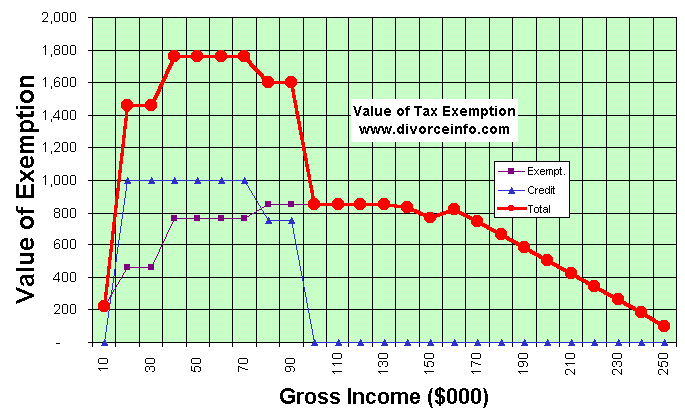The tax exemptions available to the parents of children are helpful on your tax return, and gladiators for both parents often encourage their clients to fight for them. It’s sometimes not a good idea. Here’s why.
Most dads paying child support are convinced they’re entitled to the exemption because they’re contributing more than half the support for the child. They’re wrong. As between divorced parents, the exemption by law belongs to the parent with whom the child spends the greater portion of the year, and the child supportguidelines in many states presuppose that the custodial parent will have the benefit of the exemption.
In the “good old” days (that’s 1997 and earlier), I could have told you with confidence that the exemption was worth a fixed amount depending on your income. That was before the Tax Reform Act of 1997, which added a sizeable child tax credit, something called the Hope Scholarship, and something else called the Lifetime Learning Credit. The new statute says you can only enjoy these other benefits if you are able to claim the child as an exemption. So now, whether you claim the exemption governs whether you’re also eligible for several kinds of extra “goodies.”
Even though the exemption belongs to the custodial parent, he or she can trade it to the other parent. The way to do it is to file IRS Form 8332. Why would you want to do that? Simple. The chart below shows the value for the exemption for one child who is under 17. The blue line is the value of the credit. The purple line is the value of the exemption.When you combine the effect of the two, you get the bold red line. At a gross income of $20,000, for example, it’s worth a little more than $1400. The value stairsteps up to nearly $1800 at gross incomes of about $40-70,000, and it declines erratically in value as income increases above $75,000, down to a value of zero at gross incomes of $250,000 and below.

The chart takes no account of the Hope Scholarship or the Lifetime Learning Credit, which can be helpful if you’re paying tuition for a college-age child. It also doesn’t take account of the extra value of the exemptions for lower income parents of three or more children. If you have more than three children, you can take the $500 credit against FICA taxes (social security) if you don’t have enough taxable income.
So if the exemption is worth nothing to you and $1800 to the other parent, it would make sense for you to trade it to your spouse in exchange for something that’s valuable to you. That something could be extra cash, the stereo VCR, or an extra night with the kids. Remember, it’s okay to moosh.
The dirty little secret about exemptions (which is no longer a secret to you) is how the exemptions are worth different amounts to different people. All too often, people going through divorce spend thousands of dollars on lawyers arguing over who should get the exemptions — they’re not thinking strategically, are they? If you and your spouse are cooperating, you probably want to give the exemptions to the parent who can use them the most.
This is particularly true for us men. We daddies seem to have a visceral response to the exemptions for the children. It’s as if we’re saying “the kids may be living with her, but by God I’m still the daddy and I’m not lettin’ this one go.” If you’re the Mom and Dad is talking like this, I encourage you to negotiate the exemptions away for something else that’s important to you. Just make sure your agreement makes the use of the exemptions each year contingent on Dad’s being current on all his obligations under the agreement, including without limitation child support.
Here’s the kind of language you could insert in your settlement agreement if you want to do this:
The Husband will be entitled to claim the Children as dependency exemptions for Federal and State income tax purposes. The Husband and the Wife will cooperate fully with each other in the execution of all forms and documents necessary to carry out the terms of this section and to comply with applicable rules and regulations. The Husband’s right to claim these dependency exemptions will be contingent on his being in full and current compliance with all obligations described in this Agreement through December 31 of the tax year for which he seeks to claim the exemptions.